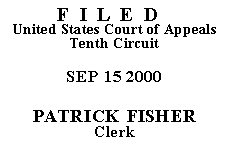

|
CANDY KAY HARE,
v.
HOWARD RAY, Warden;
ATTORNEY GENERAL OF THE
STATE OF OKLAHOMA |
|
Before BRORBY, KELLY, and MURPHY, Circuit Judges.
This case is before the court on Candy Kay Hare's pro se request for a certificate of appealability ("COA"). Hare seeks a COA so she can appeal the district court's dismissal of her 28 U.S.C. § 2254 petition. See 28 U.S.C. § 2253(c)(1)(A) (providing that no appeal may be taken from the denial of a § 2254 petition unless the petitioner first obtains a COA). Hare also seeks to proceed in forma pauperis on appeal. Because Hare has not made a substantial showing of the denial of a constitutional right, she is not entitled to a COA and her appeal is dismissed. See id. § 2253(c)(2).
Hare was convicted in Oklahoma state court of murder in the first degree and sentenced to life imprisonment. Hare's conviction was affirmed by the Oklahoma Court of Criminal Appeals ("OCCA") on October 31, 1997. Nearly one year later, on October 7, 1998, Hare filed an application for post-conviction relief with the state district court. The application was denied and Hare failed to file a timely appeal. Hare ultimately filed a second application for post-conviction relief seeking an appeal out of time. The second application was denied on June 22, 1999 and that denial was affirmed by the OCCA on August 26, 1999. Hare did not file the instant § 2254 habeas petition until January 28, 2000.
Hare's habeas petition was referred to a magistrate judge for initial proceedings pursuant to 28 U.S.C. § 636(b)(1)(B). In the report and recommendation ("R & R") prepared by the magistrate judge, the magistrate raised the timeliness of Hare's petition sua sponte and recommended that the petition be dismissed because it was filed outside the one-year limitations period set out in 28 U.S.C. § 2244(d). See 28 U.S.C. §2254(d)(1) (providing that the one-year period begins to run on the date petitioner's conviction became final); Hoggro v. Boone, 150 F.3d 1223, 1226 & n.4 (10th Cir. 1998) (holding that one-year limitations period is tolled during the period of time petitioner spends properly pursuing state post-conviction relief but is not tolled during the pendency of an untimely appeal from the denial of post-conviction relief). The magistrate judge further concluded that Hare had failed to identify any circumstances that would support an equitable tolling of the limitations period. See Miller v. Marr, 141 F.3d 976, 978 (10th Cir. 1998).
Hare filed a timely objection to the R & R but failed to demonstrate that her habeas petition was timely or advance any argument as to why the one-year limitations period should be equitably tolled. The R & R was adopted by the district court and Hare's habeas petition was dismissed.
The analysis employed by the magistrate judge to support his conclusion that Hare's habeas petition was untimely is thoroughly set forth in the R & R. Hare has presented no argument that the magistrate judge miscalculated the one-year period. Nor does Hare present any argument as to why the one-year limitations period should be equitably tolled.(1)
Before she is entitled to a COA, Hare must make a "substantial showing of the denial of a constitutional right." 28 U.S.C. § 2253(c)(2). Hare may make this showing by demonstrating the issues raised are debatable among jurists, a court could resolve the issues differently, or that the questions presented deserve further proceedings. See Slack v. McDaniel, 120 S. Ct. 1595, 1603-04 (2000).
This court has reviewed Hare's application for a COA, her appellate brief, the district court's Order dated March 22, 2000, the R & R, and the entire record on appeal. That review clearly demonstrates the district court's dismissal of Hare's § 2254 petition as untimely is not deserving of further proceedings or subject to a different resolution on appeal. Accordingly, we deny Hare's request for a COA, deny Hare's request to proceed on appeal in forma pauperis, and dismiss Hare's appeal.
ENTERED FOR THE COURT:
Michael R. Murphy
Circuit Judge
*. This order and judgment is not binding precedent, except under the doctrines of law of the case, res judicata and collateral estoppel. The court generally disfavors the citation of orders and judgments; nevertheless, an order and judgment may be cited under the terms and conditions of 10th Cir. R. 36.3.
1.Hare's COA application contains a conclusory statement, buried in a sentence, that she is actually innocent of the crime of which she was convicted. Even if this court were to consider Hare's argument for the first time on appeal, her unsupported statement asserting her actual innocence is insufficient to support the equitable tolling of the one-year limitations period.